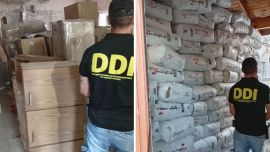TRANSITION TALKS
President Mauricio Macri will be handing over the insignia of office to his elected successor Alberto Fernández in Congress, Cabinet Chief Marcos Peña and Santiago Cafiero (his presumed successor) confirmed on Wednesday after two meetings. Macri had been holding out for the Casa Rosada as the more traditional inauguration but yielded to his successor’s preference for Congress. Thus far smooth sailing but early last week both government (including Defence and Justice Ministers Oscar Aguad and Germán Garavano) and Frente de Todos sources admitted that otherwise no transition work was underway with the president-elect’s delay in naming his future Cabinet complicating the usual procedure of consultation between current and future ministers.
ABUSE CLAIMS
A new political scandal exploding yesterday morning, charges of sexual abuse against Senator José Alperovich (previously a three-term governor of Tucumán) were levied by a 29-year-old relative and former personal assistant to the ex-governor (whose name was withheld in order to protect her identity) in the form of an emotionally charged letter under the hashtag ‘#NoNosCallamosMás.’ (See full story on page 4)
DOLLAR WATCH
The official exchange rate closed the week at 62.90 pesos per greenback but the “blue” dollar reached 67.50, rising 75 cents in the course of yesterday. Country risk dipped as low as 2,250 points during the week but closed yesterday at 2,450, fractionally up on last week.
ALBERTO & THE IMF
On Tuesday president-elect received a call from Kristalina Georgieva, the Bulgarian economist who is the new Managing Director of the International Monetary Fund, reportedly looking for a heads-up on how Argentina proposes to repay the US$ 44 billion borrowed over the last 14 months and recommending that his presidency find a way of living within its fiscal constraints. Fernández reportedly replied that this was “not immediately possible.”
ABORTION PROTOCOL ROW
The outgoing Mauricio Macri government blundered into an embarrassing U-turn when it revoked a protocol updating the guidelines for non-indictable abortions only a few hours after its publication in the Official Gazette last Wednesday, thus leading to controversy both within and beyond the ruling coalition. The resolution (which recognised the right of adolescents to decide on the interruption of their pregnancies in cases within the existing law) had been signed by Health Secretary Adolfo Rubinstein, a Radical member of Macri’s coalition, but without the approval of his immediate superior, Social Development Minister Carolina Stanley, who belongs to Macri’s PRO centre-right party. Radicals rallied behind their party colleague but he resigned yesterday. The Kirchnerite opposition rapidly jumped on the contradictions within the government, especially their health experts.
THIS WEEK IN CORRUPTION...
Prosecutor Carlos Stornelli on Thursday formally asked that Senator (and vice-presidentelect) Cristina Fernández de Kirchner be sent to trial for public works corruption during her 2007-15 presidency, along with numerous codefendants. Meanwhile, again claiming to be a victim of political persecution rather than a corrupt businessman, the jailed Kirchnerite tycoon Lázaro Báez on Wednesday accused AFI intelligence of having pressured him to incriminate ex-president Cristina Fernández de Kirchner, allegations promptly denied by AFI deputy chief Silvia Majdalani, who said: “That story only exists in his imagination.” The accusations of Báez, charged with being a prime beneficiary of public works during three Kirchnerite presidencies (2003-15), extended beyond AFI to include journalists, lawyers, prosecutors and government officials. According to Báez, Majdalani’s inducements were transmitted to him by a lawyer named Claudia Balbín, who (speaking in the name of President Mauricio Macri and Majdalani) promised him the return of both his freedom and his property if he admitted to having been a front man for the Kirchner family. The contractor, who started his career as a Santa Cruz bank clerk, also said that his eldest son Martín had been subject to similar pressures.
SUBWAY STRIKE
Since Wednesday the subway system has been hit by staggered strikes (A, B and D lines for one three-hour period and C, E and H for another) but for once the grievance is not pay – it is to protest the use of asbestos as a carcinogenic substance, an issue first raised by B line delegates.
CATHOLICISM ON THE WANE
In the homeland of Pope Francis almost 63 percent of Argentines identify themselves as Catholics today, as compared to 76.5 percent in 2008 (and 94.3 percent according to the 1970 census), according to a new study from the CONICET (National Scientific and Technical Research Council). The results also showed close to three-quarters of the population to support the separation of Church and State while 46.2 percent believe that religious education should not be taught in public schools. Meanwhile Protestantism has risen from nine to 15.3 percent of the population since 2008 and non-believers from 11.3 to 18.9 percent. Only 7.9 percent of Argentines said that the consecration of Pope Francis in 2013 had made a positive impact on their faith.
FATAL FIRE
At least five people perished last Wednesday at the La Esperanza sugar refinery in the northern province of Jujuy after the explosion of a tank of alcohol turned the plant into an inferno.
MENDOZA QUAKE
A severe earthquake measuring 6.3 degrees on the Richter scale was registered near the border between the provinces of Mendoza and San Luis on Tuesday with the seismic waves felt as far afield as this city. The tremor originated 14 kilometres below the surface, according to INPRES.


















Comments